
What is the Eurovision Song Contest?
Started way back in 1956 as a way of drawing a fractured Europe back together with the healing power of music, the Eurovision Song Contest, or Concours Eurovision de la Chanson – the contest is telecast in both English and French – is open to all active members of the European Broadcasting Union, which oversees the competition.
Each country is permitted to submit one song to the contest – a song which is selected by a variety of means, usually a winner-takes-all competition such as Sweden’s renowned Melodifestivalen – which they perform in one of two semi-finals in the hopes of making it to the glittering grand final.
Only six countries have direct entry into the grand final:
* The Big Four who fund most of the contest – UK, Germany, France and Spain
* The host country (which is the winner of the previous year’s contest)
* Italy, who didn’t take part for many years and was re-admitted in 2011 after a 14 year absence (it was one of seven countries that competed in the first event), making the Big Four the Big Five.
The winner is chosen by a 50/50 mix of viewer votes (you cannot vote for your own country) and a jury of music industry professionals in each country, a method which was chosen to counter the alleged skewing of votes based on political and/or cultural lines when voting was purely the preserve of viewers at home.
Past winners include, of course, ABBA in 1974 with “Waterloo” and Celine Dion who won for Switzerland in 1988 with “Ne partez pas sans moi”.
Above all though, the Eurovision Song Contest is bright, over the top and deliciously camp, a celebration of music, inclusiveness and togetherness that draws annual viewing figures in the hundreds of millions.
This year’s contest will be held in Kyiv, Ukraine.
NORWAY: “Grab the Moment” by JOWST
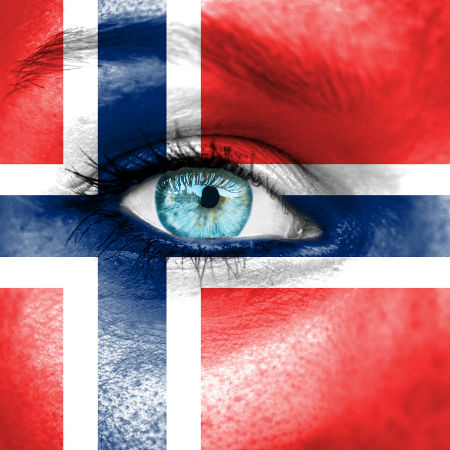
THE ARTIST
To be honest, crowdsourcing is the not the first thing that leaps to mind when you think of taking part in Eurovision.
But that is exactly what sound engineer, producer and teacher (and rampant multitasker) JOWST aka Joakim With Steen did when he was chosen to represent Norway.
Taking his abiding interest in punk rock and songwriting, JOWST gave his friends input via a Facebook group into the creation of his song “Grab the Moment”, the vocals for which are provided by Aleksander Walmann who, it seems, crowdsourced not a damn thing, concentrating instead on singing up a storm on The Voice (2012), and working with other Norwegian artists such as Sondre Lerche.
The question after all this checking and counter-checking with those nearest and dearest to him is whether this “it takes a village” approach has resulted in the kind of song that will reward JOWST’s continued quest to push himself?

THE SONG
Astonishingly yes.
I am not usually a fan of creativity by committee but in this instance, it’s worked a treat with “Grab the Moment” which comes across as a wholly engaging, fun jaunty number that bounces with the sort of irrepressible zest that will leave a smile on your face.
There are some tasty vocal flourishes all the way through courtesy of Aleksander and a whole lot of distorted, building buzz through the bridge which adds a little extra frission to a song which, while not out-of-the-box extraordinary, is definitely memorable, hummable and as danceable as they come.
Throw in a catchy stage performance and this could give Norway a real shot of making it to the grand final (although I suspect the song may not quite robust enough to garner a win).
ROMANIA: “Yodel It!” by Ilinca ft. Alex Florea
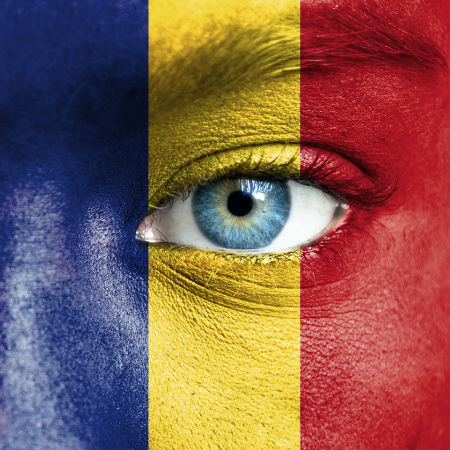
THE ARTIST
Ilinca and Alex, both of whom come from fairly impressive musical backgrounds, are by their own submission, “happy people”.
And why wouldn’t they be? They love music, have fun singing and performing and they have both been given invaluable opportunities to do something with their talent.
While Ilinca has found musical fame through programs like X Factor (she was part of a four piece girl band at the tender age of 14) and The Voice of Romania, where she reached the semi finals thank you very much, Alex has studied at music schools, first at the Popular Arts School and then at the Faculty of Fine Arts (Theatre) where he is completing a Masters.
They may have taken completely different routes to arrive at the point where they’re Romania’s entrants at Eurovision this year, but the end result is one full of ‘good energy”, “positive vibes” and “the sheer joy of being on stage”.
But will all this blissful bonhomie, the cumulative effect of which makes Tony Robbins look like Eeyore on a bad day, be enough to make the people of Europe vote for the perky Romanians en masse?

THE SONG
At first blush, you may not think so, especially when you discover that Ilinca is a yodeler, a skill which to be honest isn’t exactly the hippest of sounds around.
The funny thing is “Yodel it!” (yeah OK that also gives the game away) is a ridiculous amount of fun.
It’s not necessarily the sort of song that will win the contest, and it is pretty cheesy, but damn if it isn’t a barnburning, backslapping piece of silly, catchy ridiculousness that somehow works.
Not enough to get them out of the second semi final, but won’t we have fun yodelling ourselves through one of the few songs in this year’s roster that actually has some personality and a willingness to go there.
Granted, “there” is not the winner’s podium, but who the hell cares – well beside Ilinca and Alex who probably care a bit – when the journey is so much over the top, bombastic fun?
SAN MARINO: “Spirit of the Night” by Valentina Monetta and Jimmie Wilson
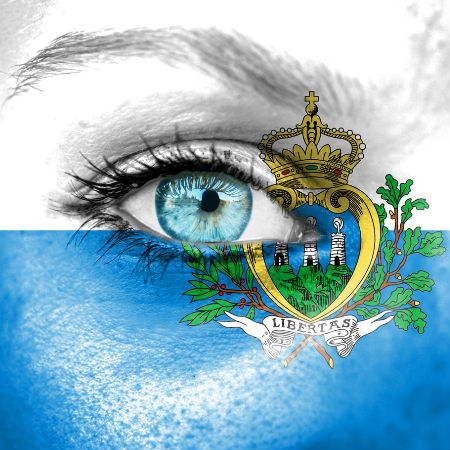
THE ARTIST
Valentina Monetta’s bio trumpets the fact from the glitter-saturated rafters that she is back!
But really when you’ve represented your country three times already (2012, 2013, 2014), can you really be considered to have actually gone away?
The jazz and funk singer, who has worked with a wide variety of musicians in Italy and Europe, and is currently performing with her band, Myfunky Valetine, has represented San Marino 50% of the time since they first competed in 2008 (they missed 2009 and 2010); this time, however, shas teamed up woth Jimmie Wilson, an American living in Germany, who is best known for performing in a series of musicals including Michael Jackson’s Sisterella.
So Valentina is back, Jimmie is here for the first time but together will they deliver that magic x factor that could catapult San Marino into the grand final and beyond, and justify Vanetina’s near constant state of Eurovision-ness?

THE SONG
“Spirit of the Night” may not be the song to do it.
Sure it’s brimming with a bright, shiny retro ’70s vibe, that is equal parts cheesy disco and sultry Barry White R&B, and both Monetta and Wilson seem to be having a ball, but somehow it all comes together in a song that sounds like it’s trying really hard and getting absolutely nowhere.
There’s lots of colour and movement but it ultimately sounds tinny and hollow, with the chorus particularly leaching out the glittering promise, such as it is, of the verses.
It’s as cliched and been there, done that as they come and will likely sink like a stone, marking yet another time San Marino has failed to qualify for the grand final.
SERBIA: “In Too Deep” by Tijana Bogićević
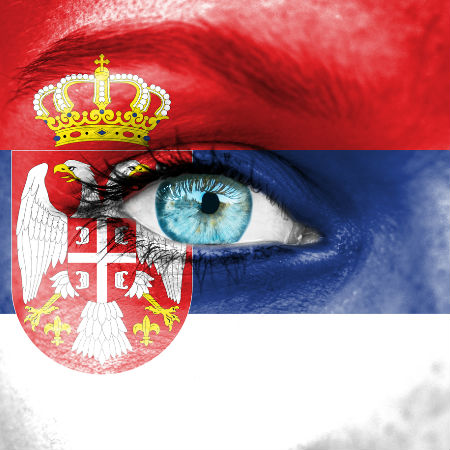
THE ARTIST
Tijana may have once had a touch of Twenty Feet From Stardom syndrome – she started out as a backing vocalist for Vlado Georgiev back in 2001 – but she has now well and truly found her place at the front of the stage thanks to her massive 2010 breakout hit “Tražim (Searching)”.
With the spotlight firmly fixed on the woman who, by all accounts, displayed an aptitude for music from a young age, she has participated in several TV talent show, dueted up a storm with the band Flamingosi and Aleksa Jelić and even has an album of her own coming the world’s way in the northern autumn.
Take that backstage anomymity!
Well, apart from performing as a backing vocalist for Serbia’s 2001 entrant Nina and her song “Čaroban (Magical)”, a momentary backward step that gave her the “invaluable experience” to make her own mark on the contest in Kyiv this year.
But is “In Too Deep”, which is perhaps not the song title you want bandied about when you’re realising a long held dream to represent your country on your terms, the song to make Eurovision wishes comes true?

THE SONG
Things kick off promisingly with a quirky musical introduction, an insistent melodic refrain that threatens to head off into some very interesting territory indeed.
Ha! More fool you. Rather than heading into trippy, funky electronica territory, the song opts for slightly interesting, occasionally beat-driven power ballad territory, a song that comes with some emotional resonance and musical intensity but nothing that, in the end, you haven’t heard a thousand times before.
It is, like a number of other songs in the contest, not a bad song per se, and Tijana certainly pours every last drop of her impressive vocal ability into bring it to life, but it’s ultimately the sort of musical number whose impact disipates almost immediately upon completion.
It could very well carry Serbia to the grand final but don’t go packing your bags for Belgrade 2018 just yet, if at all.
SWITZERLAND: “Apollo” by Timebelle
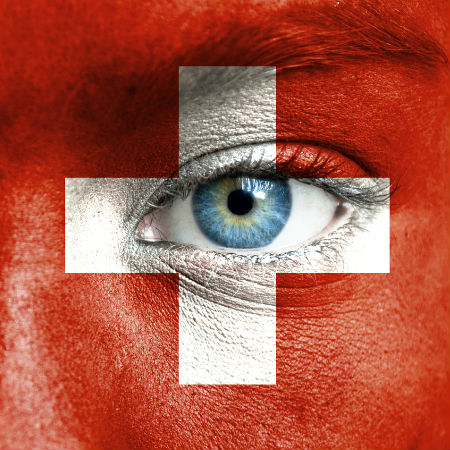
THE ARTIST
Timebelle are a group with great expectations for their participation in this year’s Eurovision Song Contest.
The Swiss group, made up of avowed chocolate lover and Romania actress and musician & singer Miruna Manescu, charming pianist, saxophonist and clarinetist Emanual Daniel Andriescu and boundlessly energetic drummer Samuel Forster, are aiming to express their “hopes and dreams”, yes all of them, through their song “Apollo”.
One of those hopes is that their entry celebrate the diversity of modern Europe, a hot button topic not just for the band who hail from other parts of Europe but have found a longterm home in Switzerland, but for everyone in an age when divisiveness and close minded rancour are trying to silence the voices of inclusion and respect.
You can only hope they achieve that goal in Kyiv, where peace, love and understanding haven’t exactly been the order of the day of late.

THE SONG
If they do fulfill their lofty aspirations, it will not be because of “Apollo”, a pity since it is the main reason they’re in the contest at all.
It is sweetly earnest, violence lyrical allusions notwithstanding which are no doubt intended to lend powerful emotional resonance to the song but carry a weirdly atonal vibe, helped along by Manescu”s robustly beautiful voice.
The chorus is uplifting and you can understand that the songwriters Elias Näslin, Alessandra Günthardt, Nicolas Günthardt have likely poured their heart and soul into this meaningful song.
But pretty does not always equate to impactful and frankly the song too often veers into emo-heavy adult midtempo rock ballad territory, pleasant enough to listen to but nowhere near as worthy as its writers and singers intend it to be.
THE NETHERLANDS: “Lights and Shadows” by OG3NE
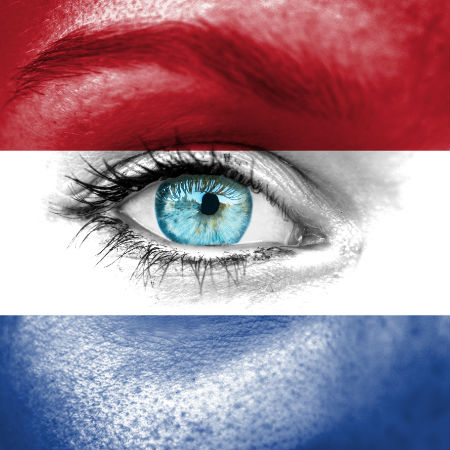
THE ARTIST
Sisters are doing for themselves if OG3NE, which “represents their mother’s blood type O and the genes that tie the three sisters together” – we’ll leave you to grapple with the pronunciation – are any indication.
Made up of Lisa (22) and twins Amy and Shelley (21), the family are incredibly musical and very close, their bonds solidified by their mother’s ongoing serious illness, the struggle of living with which has created a deep desire to take of and support each other.
It could be all that togetherness, and the polyphonous blending of their voices, that lends the trio, who were the first group to win The Voice anywhere in the world, the sort of success they’ve enjoyed since they burst onto the scene in 2016.
But is their tightness as family and artists enough to propel them, and their song “Lights and Shadows”, written by their father with Shelley’s boyfriend about the effect their mother’s illness has had on the family, enough to give them a Eurovision happily ever after?

THE SONG
As a sucker for happy endings, whatever the circumstances, I really wish that was the case.
While there is an appealing Wilson Phillips circa 1990 sound and feel to the song, recalling the lofty heights of the group’s megahit “Hold On”, and Og3NE’s voice seamlessly and appealingly blend together in almost angelic fashion, it’s not the sort of song that’s going to cut through at Eurovision.
A pleasant and uplifting time will be had by everyone in the audience, and there’s no denying the lyrical substance of the song, but it’s hard this getting The Netherlands to the grand final.
The great wildcard in all this of course could be a devastatingly good live performance which the group seem more than capable of; if that happens, then all bets are off.
RUSSIA: “Flame is Burning” by Julia Samoylova
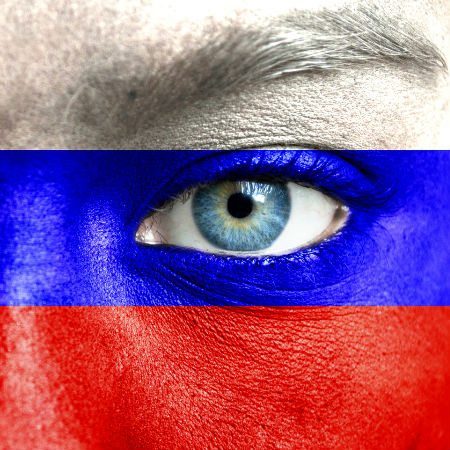
Russia will not compete in Eurovision this year.
It was supposed to, and had even gone so far as to select Yulia Samoylova who was going to sing the song “Flame is Burning”. But Yulia fell foul of a Ukrainian law which expressly forbids artists who have performed in Crimea, now occupied by Russia but which Ukraine continues to maintain, with the backing of international law, as an inalienable part of its sovereign territory, to enter Ukraine to perform. Ukraine’s refusal to allow Samoylova into the country has, after considerable acrimonious back-and-forth between the two countries, with added intervention by the European Broadcasting Union (EBU) which oversees Eurovision, led to Russia withdrawing from the contest completely, with no plans to even screen the event (a decision which could result in an EBU ban on the country being allowed to perform in the contest in 2018).
Whether you believe the Ukraine is being needlessly intransigent or Russia is being pointlessly antagonistic (Ukraine’s law was well-publicised), the fact remains that the 43 contestants of this year’s contest are down to 42, not an earthshaking development you may think numbers-wise but certainly one that has shaken many peoples’ idealistic view (in my view, overly idealistic; Eurovision will never escape geopolitical instability in some form or another) of the contest as a bastion of peace and togetherness in a fractious, divided world.
For more on the story, please go to Wiwibloggs, BBC, The Guardian and SBS.
I will say that it’s very annoying that more artists have cottoned onto the marketing gem that Oooooorovision is these days. Makes it way more interesting if people throw in some ‘pearlers’ though there are a few this year. Plus the judges choices certainly can mix things up.
Anyway, Semi 2 picks with the usual Anggun caveat re performances that tank:
1. Belarus
2. Denmark
3. FYR Macedonia
4. Hungary
5. Israel
6. Lithuania
7. Malta
8. Norway
9. Serbia (with aerial hoop)
10. The Netherlands
Wild Card – Romania – Just can’t figure if Europe will go for yodelling, even though a country & western song came 2nd in 2014 (The Netherlands).
Yeah it’s a very weak cookie cutter kind of yeah with everyone trying to game the system. Yawn inducing for the most part and you’re bang on, not much creativity at all.